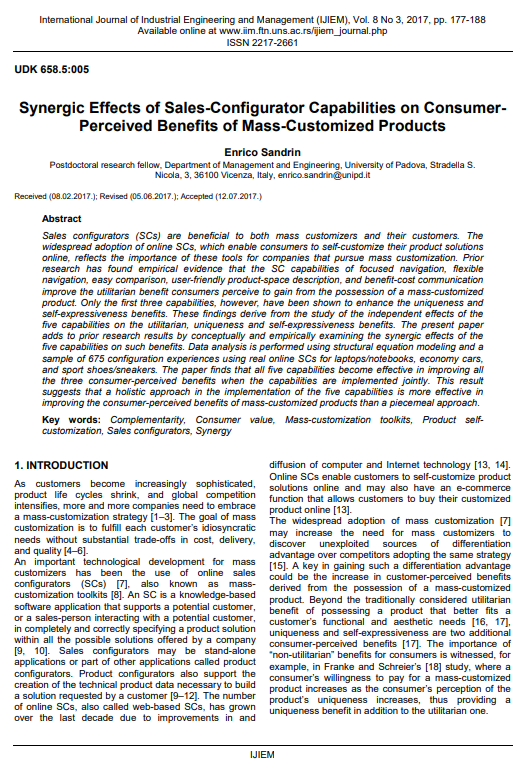Synergic Effects of Sales-Configurator Capabilities on Consumer-Perceived Benefits of Mass-Customized Products

Published 2017-09-30
abstract views: 28 // FULL TEXT ARTICLE (PDF): 0
Keywords
- Complementarity,
- Consumer value,
- Mass-customization toolkits,
- Product self-customization,
- Sales configurators
- Synergy ...More
How to Cite
Copyright (c) 2023 International Journal of Industrial Engineering and Management

This work is licensed under a Creative Commons Attribution 4.0 International License.
Abstract
Sales configurators (SCs) are beneficial to both mass customizers and their customers. The widespread adoption of online SCs, which enable consumers to self-customize their product solutions online, reflects the importance of these tools for companies that pursue mass customization. Prior research has found empirical evidence that the SC capabilities of focused navigation, flexible navigation, easy comparison, user-friendly product-space description, and benefit-cost communication improve the utilitarian benefit consumers perceive to gain from the possession of a mass-customized product. Only the first three capabilities, however, have been shown to enhance the uniqueness and self-expressiveness benefits. These findings derive from the study of the independent effects of the five capabilities on the utilitarian, uniqueness and self-expressiveness benefits. The present paper adds to prior research results by conceptually and empirically examining the synergic effects of the five capabilities on such benefits. Data analysis is performed using structural equation modeling and a sample of 675 configuration experiences using real online SCs for laptops/notebooks, economy cars, and sport shoes/sneakers. The paper finds that all five capabilities become effective in improving allthe three consumer-perceived benefits when the capabilities are implemented jointly. This result suggests that a holistic approach in the implementation of the five capabilities is more effective in improving the consumer-perceived benefits of mass-customized products than a piecemeal approach.
Article history: Received (08.02.2017); Revised (05.06.2017); Accepted (12.07.2017)

